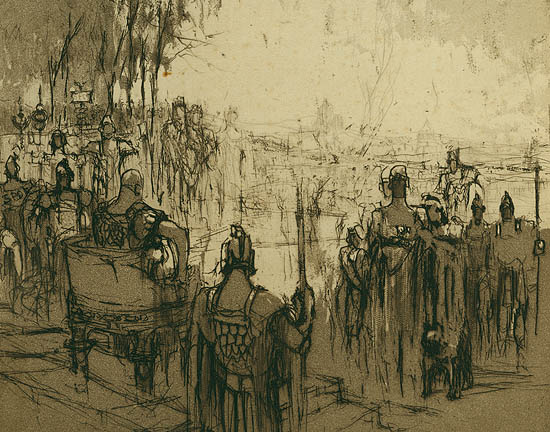![]()
William Walcot, R.E. 1874-1943.

The Pageant of Ludlow: The British Chief Caractacus, a Prisoner Before the Roman General Osterius in 50 AD. 1934. Etching, aquatint and drypoint. 7 3/4 x 9 1/4 (sheet 14 3/8 x 14 3/8). Printed in brown ink on white wove paper. Unobtrusive foxing. Signed in pencil. $500.
The work is from a set of 6 etchings done with Frank Brangwyn. The Pageant of Ludlow was produced to celebrate the tercentenary of the production of Milton's Comus at Ludlow Castle. The six etchings illustrate that masque. Three etchings wre done by Frank Brangwyn and three by William Walcot.
Caratacus is named by Dio Cassius as a son of the Catuvellaunian king Cunobelinus. Caratacus and his brother Togodumnus led the initial defence of the country against Aulus Plautius's four legions thought to have been around 40,000 men, primarily using guerrilla tactics. They lost much the south-east after being defeated in two crucial battles on the rivers Medway[3] and Thames. Togodumnus was killed and the Catuvellauni's territories were conquered. Claudius was present in August when his legions marched into Camulodunum, the capital of the Catuvellauni [4], but Caratacus survived and carried on the resistance further west.
We next hear of Caratacus in Tacitus's Annals, leading the Silures and Ordovices of modern Wales against Plautius's successor as governor, Publius Ostorius Scapula.[5] Finally, in 51, Scapula managed to defeat Caratacus in a set-piece battle somewhere in Ordovician territory (see the Battle of Caer Caradoc), capturing Caratacus's wife and daughter and receiving the surrender of his brothers. Caratacus himself escaped, and fled north to the lands of the Brigantes (modern Yorkshire where the Brigantian queen, Cartimandua handed him over to the Romans in chains
After his capture, Caratacus was sent to Rome as a war prize, presumably to be killed after a triumphal parade. Although a captive, he was allowed to speak to the Roman senate. Tacitus records a version of his speech in which he says that his stubborn resistance made Rome's glory in defeating him all the greater:
“ If the degree of my nobility and fortune had been matched by moderation in success, I would have come to this City as a friend rather than a captive, nor would you have disdained to receive with a treaty of peace one sprung from brilliant ancestors and commanding a great many nations. But my present lot, disfiguring as it is for me, is magnificent for you. I had horses, men, arms, and wealth: what wonder if I was unwilling to lose them? If you wish to command everyone, does it really follow that everyone should accept your slavery? If I were now being handed over as one who had surrendered immediately, neither my fortune nor your glory would have achieved brilliance. It is also true that in my case any reprisal will be followed by oblivion. On the other hand, if you preserve me safe and sound, I shall be an eternal example of your clemency."[8] ”
He made such an impression that he was pardoned and allowed to live in peace in Rome. After his liberation, according to Dio Cassius, Caratacus was so impressed by the city of Rome that he said "And can you, then, who have got such possessions and so many of them, covet our poor tents?"
![]()
To order, for more information or to be placed on the email list, contact Jane Allinson (jane@allinsongallery.com).